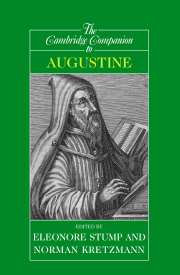Book contents
- Frontmatter
- Introduction
- 1 Augustine
- 2 Faith and reason
- 3 Augustine on evil and original sin
- 4 Predestination, Pelagianism, and foreknowledge
- 5 Biblical interpretation
- 6 The divine nature
- 7 De Trinitate
- 8 Time and creation in Augustine
- 9 Augustine’s theory of soul
- 10 Augustine on free will
- 11 Augustine’s philosophy of memory
- 12 The response to skepticism and the mechanisms of cognition
- 13 Knowledge and illumination
- 14 Augustine’s philosophy of language
- 15 Augustine’s ethics
- 16 Augustine’s political philosophy
- 17 Augustine and medieval philosophy
- 18 Post-medieval Augustinianism
- Bibliography
- Index
8 - Time and creation in Augustine
Published online by Cambridge University Press: 28 May 2006
- Frontmatter
- Introduction
- 1 Augustine
- 2 Faith and reason
- 3 Augustine on evil and original sin
- 4 Predestination, Pelagianism, and foreknowledge
- 5 Biblical interpretation
- 6 The divine nature
- 7 De Trinitate
- 8 Time and creation in Augustine
- 9 Augustine’s theory of soul
- 10 Augustine on free will
- 11 Augustine’s philosophy of memory
- 12 The response to skepticism and the mechanisms of cognition
- 13 Knowledge and illumination
- 14 Augustine’s philosophy of language
- 15 Augustine’s ethics
- 16 Augustine’s political philosophy
- 17 Augustine and medieval philosophy
- 18 Post-medieval Augustinianism
- Bibliography
- Index
Summary
Augustine's most extensive discussions of philosophical and theological cosmology are found in his commentaries on Genesis (De Genesi contra Manichaeos, De Genesi ad litteram imperfectus liber, De Genesi ad litteram libri duodecim), in the last three books of the Confessions, and in Books 11 and 12 of the De civitate Dei. The main lines of his view of the creation are as follows. God created both the spiritual realm of angels and the visible world, including the incarnated souls, out of nothing (ex nihilo), without any pre-existing matter or other things outside God, so that ontologically new beings came into existence. The creation was based on an eternal free act of God's perfectly good will. It took place through God's omnipotence without toil, effort, or industry. God created simultaneously all first actualized things and, through “seminal reasons” inherent in them, the conditions of all those things which were to come up to the end of the world. God is the only creator. Created beings cannot bring things into existence out of nothing. God created time in creating movement in the universe. The story of the six days of creation is a metaphor which helps human imagination. Augustine sometimes interprets the “beginning”' (in principio) of Gen. 1.1 as a temporal beginning, but following an established tradition, he also takes it to refer to the Word or the Son of God (John 1.1-3): “In this beginning, God, you made heaven and earth, in your Word, in your Son, in your power, in your wisdom, in your truth” (Conf. 11.9.11).
- Type
- Chapter
- Information
- The Cambridge Companion to Augustine , pp. 103 - 115Publisher: Cambridge University PressPrint publication year: 2001
- 8
- Cited by



